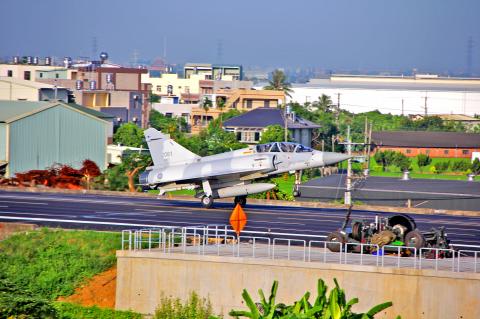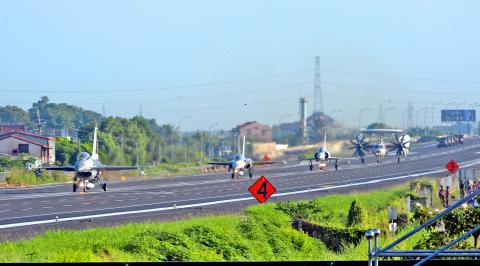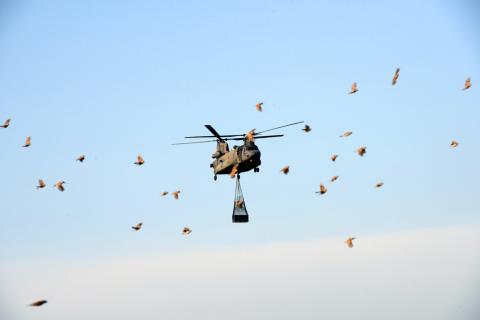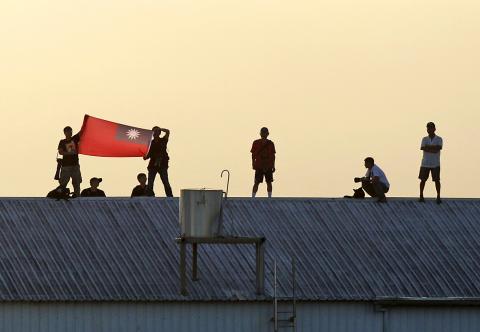The air force’s main combat aircraft, including F16 and Mirage jets, practiced emergency takeoffs and landings on sections of a freeway in the south yesterday as part of the military’s annual Han Kuang series of exercises that began on Monday.
An F-16 fighter jet, a Mirage 2000-5 and an Indigenous Defense Fighter (IDF) were used in the drill, landing shortly after 7am on the Minxiong (民雄) section of the Sun Yat-sen Freeway (National Freeway No. 1) in Chiayi County.
It was the first time the air force had one of its E-2K airborne early warning aircraft take part in the freeway practices.

Photo: Lin I-chang, Taipei Times
The E-2K, an all-weather early warning and control system platform equipped with radar and surveillance systems, has an extremely large wingspan which covers nearly the width of the freeway.
The E-2K pilot landed smoothly, gliding to the end of the temporary runway while folding up the craft’s large wings and moving to the designated area for resupply.
Other aircraft taking part in the drill included a CH-47 Chinook helicopter, an OH-58D reconnaissance helicopter and two AH-1W Super Cobra attack helicopters.

Photo: CNA
Yesterday’s exercise was to simulate an attack from China that destroys the air force base runways, requiring the military to rely on freeways as makeshift airstrips, an air force official said.
The Minxiong section is one of four sections of the nation’s main north-south freeway designated as emergency runways in the event of war.
The drill began with an F-16 landing on the freeway, followed by the IDF, the Mirage 2000-5 and the E-2K. Ground crews reloaded the aircraft’s ammunition bays and refueled the jets before they took off.

Photo: AFP
The F-16 was loaded with AIM-120 advanced medium-range air-to-air missiles, while the IDF and the Mirage fighter were loaded with AIM-9P4 Sidewinder missiles and MICA air-to-air missiles respectively, the air force said.
The twin-engine CH-47 Chinook, which was escorted by AH-1W Super Cobra helicopters, was used to deliver supplies.
Chief of General Staff Admiral Kao Kuang-chi (高廣圻) oversaw the exercise.

Photo: Reuters
The military coordinated with transportation agencies on the maintenance of the roadway before the drill, including repaving it to make sure it was flat, and familiarizing ground crews and pilots with the freeway, he said.
Colonel Shih Sheng-te (施勝德) of the air force’s 455th Tactical Fighter Wing said the Minxiong site presents pilots with several difficulties.
“Preparations were made beforehand to avoid bird collisions and intrusion of other objects. The area is also complicated by the presence of T-bars, power transmission towers and electricity grid lines. The Minxiong section is the most difficult among all the nation’s freeway emergency landing sections,” he said.
Another feature of yesterday’s drill was the use civilian aircraft to transport military personnel taking part in the exercises. Far Eastern Air Transport (遠東航空) and TransAsia Airways (復興航空), together with military C-130 planes, ferried one battalion of soldiers from an airport in Greater Kaohsiung to an air base in Penghu.
Meanwhile, two civilians trying to take photographs of the drill were injured after falling off a ladder as a CH-47 Chinook helicopter was delivering supplies for the fighter jets.
The strong vortex winds generated by the chopper’s rotors made it difficult for the pair to keep their balance, said Lieutenant General Wang Hsuan-chou (汪旋周), director-general of the air force’s Political Warfare Department.
“One man sustained an injury to his jaw and was discharged from Chiayi Christian Hospital after treatment, while the other man fractured his hand,” Wang said.
Yesterday’s drill was part of the second stage of the “Han Kuang 30” exercises, which are to run through Friday.

INVESTIGATION: The case is the latest instance of a DPP figure being implicated in an espionage network accused of allegedly leaking information to Chinese intelligence Democratic Progressive Party (DPP) member Ho Jen-chieh (何仁傑) was detained and held incommunicado yesterday on suspicion of spying for China during his tenure as assistant to then-minister of foreign affairs Joseph Wu (吳釗燮). The Taipei District Prosecutors’ Office said Ho was implicated during its investigation into alleged spying activities by former Presidential Office consultant Wu Shang-yu (吳尚雨). Prosecutors said there is reason to believe Ho breached the National Security Act (國家安全法) by leaking classified Ministry of Foreign Affairs information to Chinese intelligence. Following interrogation, prosecutors petitioned the Taipei District Court to detain Ho, citing concerns over potential collusion or tampering of evidence. The

‘FORM OF PROTEST’: The German Institute Taipei said it was ‘shocked’ to see Nazi symbolism used in connection with political aims as it condemned the incident Sung Chien-liang (宋建樑), who led efforts to recall Democratic Progressive Party (DPP) Legislator Lee Kun-cheng (李坤城), was released on bail of NT$80,000 yesterday amid an outcry over a Nazi armband he wore to questioning the night before. Sung arrived at the New Taipei City District Prosecutors’ Office for questioning in a recall petition forgery case on Tuesday night wearing a red armband bearing a swastika, carrying a copy of Adolf Hitler’s Mein Kampf and giving a Nazi salute. Sung left the building at 1:15am without the armband and apparently covering the book with a coat. This is a serious international scandal and Chinese

Seventy percent of middle and elementary schools now conduct English classes entirely in English, the Ministry of Education said, as it encourages schools nationwide to adopt this practice Minister of Education (MOE) Cheng Ying-yao (鄭英耀) is scheduled to present a report on the government’s bilingual education policy to the Legislative Yuan’s Education and Culture Committee today. The report would outline strategies aimed at expanding access to education, reducing regional disparities and improving talent cultivation. Implementation of bilingual education policies has varied across local governments, occasionally drawing public criticism. For example, some schools have required teachers of non-English subjects to pass English proficiency

TRADE: The premier pledged safeguards on ‘Made in Taiwan’ labeling, anti-dumping measures and stricter export controls to strengthen its position in trade talks Products labeled “made in Taiwan” must be genuinely made in Taiwan, Premier Cho Jung-tai (卓榮泰) said yesterday, vowing to enforce strict safeguards against “origin laundering” and initiate anti-dumping investigations to prevent China dumping its products in Taiwan. Cho made the remarks in a discussion session with representatives from industries in Kaohsiung. In response to the US government’s recent announcement of “reciprocal” tariffs on its trading partners, President William Lai (賴清德) and Cho last week began a series of consultations with industry leaders nationwide to gather feedback and address concerns. Taiwanese and US officials held a videoconference on Friday evening to discuss the